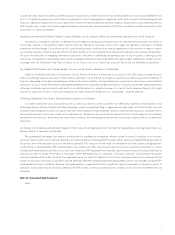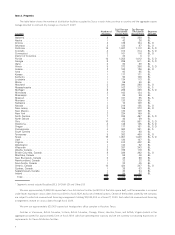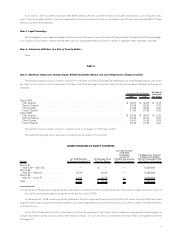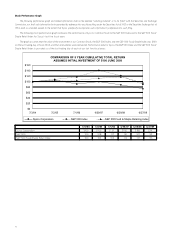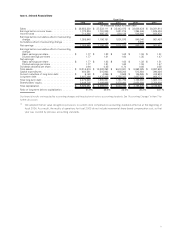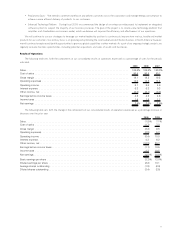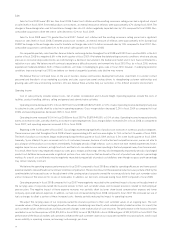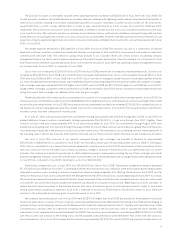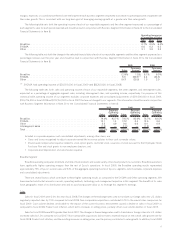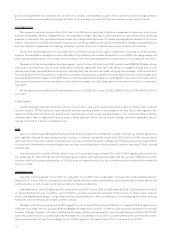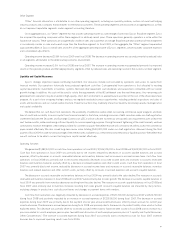Sysco 2009 Annual Report Download - page 36
Download and view the complete annual report
Please find page 36 of the 2009 Sysco annual report below. You can navigate through the pages in the report by either clicking on the pages listed below, or by using the keyword search tool below to find specific information within the annual report.assets of the Retirement Plan during fiscal 2009, partially offset by an increase in the discount rates used to calculate our projected benefit obligation
and related pension expense for fiscal 2010.
We recorded provisions related to multi-employer pension plans of $9,585,000 in fiscal 2009, $22,284,000 in fiscal 2008 and $4,700,000 in
fiscal 2007. See additional discussion of multi-employer pension plans at “Liquidity and Capital Resources, Other Considerations.”
Net Earnings
Net earnings declined 4.5% in fiscal 2009 from fiscal 2008 due primarily to the impact of changes in income taxes discussed below, as well as
the factors discussed above. Net earnings increased 10.5% in fiscal 2008 over fiscal 2007 due primarily to the factors discussed above, as well as the
impact of changes in income taxes discussed below.
The effective tax rate was 40.37% in fiscal 2009, 38.25% in fiscal 2008 and 38.25% in fiscal 2007.
The effective tax rate for fiscal 2009 was negatively impacted primarily by two factors. First, the company recorded tax adjustments related to
federal and state tax contingencies of $31,000,000. Second, the loss of $43,812,000, which had a tax effect of $16,824,000, recorded to adjust the
carrying value of corporate-owned life insurance policies to their cash surrender values was non-deductible for income tax purposes and had the
impact of increasing the effective tax rate for the period. The effective tax rate for fiscal 2009 was favorably impacted by the reversal of valuation
allowances of $7,800,000 previously recorded on Canadian net operating loss deferred tax assets.
The effective tax rate for fiscal 2008 was favorably impacted by tax benefits of approximately $7,700,000 resulting from the recognition of a
net operating loss deferred tax asset which arose due to a state tax law change, $8,600,000 related to the reversal of valuation allowances
previously recorded on Canadian net operating loss deferred tax assets and $5,500,000 related to the reduction in net Canadian deferred tax
liabilities due to a federal tax rate reduction.The effective tax rate for fiscal 2008 was negatively impacted by the recording of tax and interest related
to uncertain tax positions, share-based compensation expense and the recognition of losses of $8,718,000, which had a tax effect of $3,348,000,
recorded to adjust the carrying value of corporate-owned life insurance policies to their cash surrender values.
The effective tax rate for fiscal 2007 was favorably impacted by the recognition of gains of $23,922,000, which had a tax effect of $9,186,000,
recorded to adjust the carrying value of corporate-owned life insurance policies to their cash surrender values. The effective tax rate for fiscal 2007
was negatively impacted by the recognition of tax and interest for tax contingencies.
Sysco’s affiliate, Baugh Supply Chain Cooperative (BSCC), is a cooperative taxed under subchapter T of the United States Internal Revenue
Code the operation of which has resulted in a deferral of tax payments. The Internal Revenue Service (IRS), in connection with its audits of our 2003
through 2006 federal income tax returns proposed adjustments that would have accelerated amounts that we had previously deferred and would
have resulted in the payment of interest on those deferred amounts. Sysco reached a settlement with the IRS on August 21, 2009 to cease paying
U.S. federal taxes related to BSCC on a deferred basis, pay the amounts currently recorded within deferred taxes related to BSCC over a three year
period and make a one-time payment of $41,000,000, of which approximately $39,000,000 is non-deductible.The settlement addresses the BSCC
deferred tax issue as it relates to the IRS audit of our 2003 through 2006 federal income tax returns, and settles the matter for all subsequent
periods, including the 2007 and 2008 federal income tax returns already under audit. We had previously accrued interest during the period of
appeals and as a result of the settlement with the IRS, Sysco will record an income tax benefit of approximately $30,000,000 in the first quarter of
fiscal 2010.
Earnings Per Share
Basic earnings per share and diluted earnings per share decreased 3.3% and 2.2%, respectively, in fiscal 2009 from the prior year. Basic
earnings per share and diluted earnings per share increased 13.0% and 13.1%, respectively, in fiscal 2008 over the prior year. These changes were
primarily the result of factors discussed above, as well as a net reduction in shares outstanding. The net reduction in average shares outstanding was
primarily due to share repurchases. The net reduction in diluted shares outstanding was primarily due to share repurchases and an increase in the
number of anti-dilutive options excluded from the diluted shares calculation.
As a result of the IRS settlement noted above, Sysco will record an income tax benefit of approximately $30,000,000 in the first quarter of fiscal
2010. We expect this to positively impact our diluted earnings per share by approximately $0.05 per share.
Segment Results
We have aggregated our operating companies into a number of segments, of which only Broadline and SYGMA are reportable segments as
defined in accounting provisions related to disclosures about segments of an enterprise. The accounting policies for the segments are the same as
those disclosed by Sysco within the Financial Statements and Supplementary Data within Part II Item 8 of this Form 10-K. Intersegment sales
generally represent specialty produce and meat company products distributed by the Broadline and SYGMA operating companies. The segment
results include certain centrally incurred costs for shared services that are charged to our segments.These centrally incurred costs are charged based
upon the relative level of service used by each operating company consistent with how management views the performance of its operating
segments.
Management evaluates the performance of each of our operating segments based on its respective operating income results, which include the
allocation of certain centrally incurred costs. While a segment’s operating income may be impacted in the short term by increases or decreases in
16



